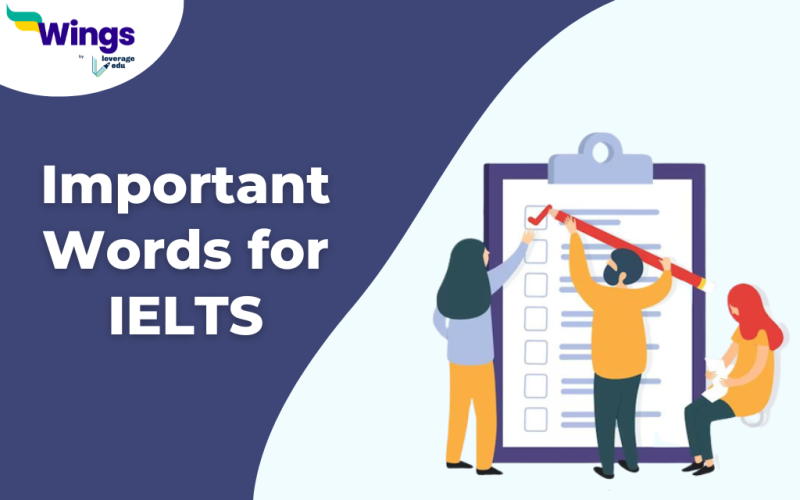IELTS, or the International English Language Testing System, is an exam that assesses a person’s ability to use the English language in various settings, such as academic, professional, or social. The test consists of four sections: Listening, Reading, Writing, and Speaking, and is designed to measure a test-takers ability to understand, speak, read, and write in English. One crucial aspect of IELTS preparation is the acquisition of new vocabulary. This is because a broad vocabulary is essential in both the reading and writing sections of the test. A strong vocabulary allows you to understand the passages and questions more effectively, as well as express your ideas more clearly in writing. In this blog, we have curated a list of 25+ important words for the IELTS Exam, make sure to read them carefully.
IELTS List of Important Words and Their Meaning
| Words | Meaning |
| Hostile | unfriendly, aggressive or antagonistic |
| Flout | to openly disregard a rule or law |
| Incentive | something that motivates or encourages one to take action |
| Jarring | causing a shock or disturbance |
| Jargon | specialized language or terminology used in a particular field |
| Keenly | with great interest, enthusiasm, or awareness |
| Nuance | a subtle difference in meaning or expression |
| Probability | the likelihood of something happening or being true |
| Unanimously | in complete agreement or with everyone’s approval |
| Vaguely | in a way that is unclear, uncertain, or indefinite |
| Tend | to have a tendency or inclination towards something |
| Threaten | to express an intention to harm or cause damage |
| Whopping | very large or impressive in size or amount |
| Analyze | to examine something in detail |
| Variable | something that is liable to vary or change |
| Derived | obtained or developed from a source |
| Predict | to forecast or estimate future events |
| Conflict | a serious disagreement or argument |
| Substantiate | to provide evidence or proof to support a claim or argument |
| Allocate | to distribute resources or responsibilities for a specific purpose |
| Comprehensive | unfriendly, aggressive or antagonistic openly disregard a rule or law something that motivates or encourages one to take action causing a shock or disturbance covering all aspects or aspects of a subject current or modern understanding or grasping something, or to arrest someone open to more than one interpretation or meaning |
| Contemporary | current or modern |
| Apprehend | to understand or grasp something, or to arrest someone |
| Ambiguous | open to more than one interpretation or meaning |
Must Read: Best Ways to Improve Your Vocabulary for IELTS
Scientific Tips to Learn Difficult Words for IELTS
Learning difficult words for the IELTS exam can be challenging, but here are some scientific tips that can help:
- Spaced repetition is a technique where you review information at increasingly longer intervals over time. This technique helps you to retain information better and for longer periods of time.
- Mnemonics are memory aids that help you remember information by associating it with something else. For example, you can associate the word “perfunctory” with “perfectly functioning machinery”. This will help you remember the meaning of the word more easily.
- Reading extensively can expose you to a wide range of vocabulary, including difficult words. Read articles, books, and other materials that interest you and pay attention to the words you don’t know. Look up their meanings and try to use them in your own writing and speaking.
- Context clues are words or phrases in a sentence that can help you understand the meaning of a difficult word. Pay attention to the words that come before and after the difficult word, as well as the overall context of the sentence.
- Practice using the difficult words in your own writing and speaking. This will help you remember them better and be able to use them effectively on the IELTS exam.
FAQs
To enhance your vocabulary for the IELTS test, it’s recommended to utilize word lists made specifically for the exam. Furthermore, extensive reading can also expose you to a more diverse range of vocabulary. Utilizing flashcards with spaced repetition, using context clues, and associating words through mnemonics are also effective strategies.
The number of words to learn per day for the IELTS exam varies based on individual abilities and goals. However, aim to learn at least 10-20 new words every day to expand your vocabulary steadily.
To improve pronunciation for the IELTS Speaking Test, listen to and imitate native English speakers, use online resources and language learning apps, practice speaking aloud, and record yourself to identify areas for improvement.
We hope the information mentioned in this blog helped you in improving your vocabulary for IELTS. Leverage Edu provides excellent Online IELTS preparation. Get in touch with our experts to start your IELTS preparation. For more updates related to IELTS Vocabulary, stay tuned to our official webpage. You can also follow us on Instagram, Facebook, Twitter, and Linkedin to get your portion of overseas education updates.


 One app for all your study abroad needs
One app for all your study abroad needs












 60,000+ students trusted us with their dreams. Take the first step today!
60,000+ students trusted us with their dreams. Take the first step today!